Dream Big. Breathe Easier
Read more about the Respiratory Research fundraising campaign with the MUHC Foundation

Chronic Airways Disease
Meakins faculty study the mechanisms of chronic airways diseases including asthma, COPD, and pulmonary fibrosis. A major focus of this research theme is to develop novel therapeutics for allergic inflammation & airway hyperresponsiveness. Our faculty research the cellular and molecular basis for irritant-induced lung diseases, including air pollution, cigarette smoke, cannabis, vaping, and chlorine, using a variety of in vivo and in vitro models. Our translational research evaluates patients with severe asthma and asthma-COPD Overlap Syndrome (ACOS) through the Severe Asthma Program at the MUHC, which is looking at the natural history of this diseases and airway inflammation endotypes. This research provides new insights into the biological basis for asthma phenotypes. The Meakins has a high-throughput tissue mechanics testing apparatus to study the contractile properties of airway smooth muscle and how it alters in response to inflammation. A translational research program on pulmonary fibrosis and interstitial lung diseases examines mechanisms of fibroblast metabolism and differentiation. A translational research program on rare respiratory diseases focuses on mechanistic studies and pediatric-to-adult transition care. Research on lung diseases across the lifespan is elucidating developmental origins of COPD by studying airway branching variations.

Recent posts

CIHR Project Grant Results – Fall 2023
Congratulations to Carolyn Baglole and Andrea Benedetti, who were funded in the Fall 2023 CIHR Project Grant Competition!

Bruce Mazer Receives 2023 Bram Rose Award
Congratulations to Dr. Bruce Mazer, recipient of the 2023 Bram Rose Award for Contribution to the Practice of Allergy in Quebec.

MI4 Pfizer Early Career Investigator Award
Congratulations to Bryan Ross for his MI4 Pfizer Early Career Investigator Award

All airway trees are not created equal
A recent study by Benjamin Smith reveals that airway-to-lung size ratio is possibly the most important factor in death by lung disease.

CIHR Project Grant Results – Spring 2023
Congratulations to Jim Martin and Jonathon Campbell who were funded in the Spring 2023 CIHR Project Grant Competition!

MUHC Trottier Webster Innovation Award Goes to RESP Team
Congrats to Ben Smith, Jun Ding and Larry Lands! The team received the MUHC Trottier Webster Innovation Award for their work to repair damaged lungs in COPD.
Infection, Inflammation and Lung Injury
This theme examines the role of inflammation and how it contributes to lung disease and lung injury. A central goal is to identify the key molecular effectors of immune responses that determine respiratory health. The Meakins has expertise in studying the innate and adaptive immune systems and how they coordinate a host’s response to respiratory pathogens such as influenza, TB, and Cryptococcus neoformans. Investigations into trained immunity are elucidating how the education of hematopoietic stem cells offers long-term innate immune protection against Mycobacterium tuberculosis and other pulmonary pathogens. Our faculty also have expertise in dissecting host-pathogen interactions and signaling networks that drive chronic infections and acute pulmonary exacerbations in chronic lung diseases, such as Pseudomonas aeruginosa in cystic fibrosis. A new area of investigation is focused on the gut and lung microbiomes, and how the gut-lung axis influences immune responses that control respiratory health and disease.

Recent Posts

BCG Vaccine Offers Cross-protection Against Influenza
Publication by Maziar Divangahi shows how BCG vaccination provides protection against influenza A viral infection

2024 CIHR-CTS Mid-Career Lecturer in Respiratory Sciences
Congratulations to Dr. Maziar Divangahi, who has been named the 2024 CIHR-CTS Mid-Career Lecturer in Respiratory Sciences for 2024.

Focused screening of new residents, key to fight TB in Canada
Dr. Kevin Schwartzman published a study on an efficient and cost-effective way to reduce the prevalence of TB in Canada.

More than 75% of Canadians had immunity to SARS-CoV-2 due to infection by March 2023
Study by Bruce Mazer showed that more than 75% of Canadians had immunity to SARS-CoV-2 due to infection by March 2023

CIHR Project Grant Results – Spring 2023
Congratulations to Jim Martin and Jonathon Campbell who were funded in the Spring 2023 CIHR Project Grant Competition!

National Sanitarium Association Funds TB Research
Congratulations to Jonathon Campbell who received funding from the National Sanitarium Association Scholars Program.
Neuromuscular Dysfunction in Respiratory Diseases
This research theme focuses on disorders of respiratory and limb muscles in patients with chronic pulmonary diseases. The overarching goal of this theme is to elucidate mechanisms of muscle atrophy in the diaphragm and limb muscles. Meakins members first defined the entity of ‘ventilator-induced diaphragmatic dysfunction’ (VIDD), which describes diaphragm weakness following mechanical ventilation of patients in the ICU. Parallel human and animal investigations make for a unique translational research program that examines the development and mechanisms of diaphragm weakness and injury. Research is also focused on identifying the mechanisms of respiratory muscle wasting and injury in non-pulmonary conditions, such as muscular dystrophy, and ICU myopathy. Our faculty research the cellular mechanisms of frailty in aging skeletal muscles, and how aging influences the development of muscle atrophy and weakness in respiratory patients. The ultimate goal is to develop novel therapeutic modalities capable of mitigating muscle atrophy and maintaining muscle strength in the above conditions.

Recent Posts

Run for a Reason 2022
Meet the MONTREAL CHEST HOSPITAL (MCI) team at the 2022 MUHC Foundation’s “Run for a Reason” charity challenge
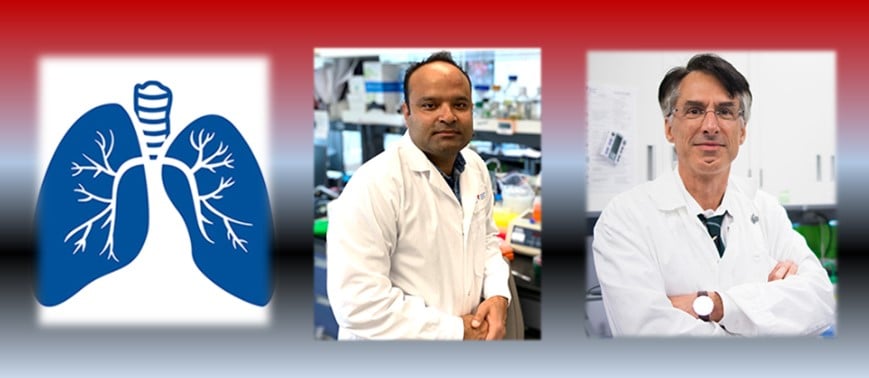
Muscular dystrophy and trained immunity
Basil Petrof, MD, and his research team, have uncovered a new mechanism of inflammation in muscular dystrophy, paving the way for the development of new therapies.

3 CIHR Project Grants and 2 COVID-19 Grants Awarded!
Congratulations to Basil Petrof, Jun Ding and Faiz Ahmad Khan who were funded in the Fall 2021 Project Grant Competition!

Three CIHR Project Grants Awarded!
Congratulations to Sabah Hussain, Kevin Schwartzman, and Jean Bourbeau on their CIHR Projects Grants!

COVID-19 Code Life Ventilator Challenge
Dr. Peter Goldberg receives an Innovation grant to build a clinical-grade ventilator that can be produced cheaply and easily
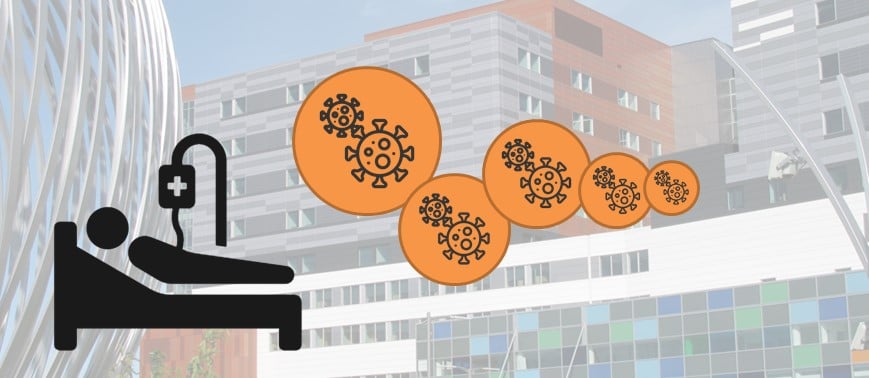
COVID-19: A Long Road to Recovery
Dr. Goldberg in La Presse – COVID-19 patients’ experiences post-ICU: enduring side effects and a long recovery.
Sleep-Disordered Breathing
This theme has a major focus on sleep-disordered breathing, including obstructive sleep apnea and its link to neurological and cardiometabolic disorders. Our members have experience running clinical trials that examine the effects of sleep-disordered breathing treatments on clinical outcomes in patients with common neurodegenerative disorders, including multiple sclerosis and Parkinson’s diseases, as well as non-invasive ventilation in ALS patients. The effects on sleep-disordered breathing treatments on gestational diabetes and glucose control are actively being researched. This theme touches upon health across the lifespan and a unique provincial cohort is examining the effect of maternal sleep apnea in pregnancy, and its effects on maternal-fetal outcomes. A fundamental research program investigates the effects of intermittent hypoxia on respiratory and peripheral muscle structure, function, inflammation and metabolism. Research is also focused on identifying novel biomarkers of obstructive sleep apnea.

Recent Posts

2023 MUHC Foundation MCI Innovation Grant Awards
Congratulations to the 2023 MUHC Foundation MCI Innovation Grants competition winners, Jonathon Campbell, Maziar Divangahi, Nicole Ezer, Simon Rousseau, Sushmita Pamidi, Salman Qureshi and Bryan Ross!

CIHR Project Grant Results – Fall 2022
Congratulations to Jim Martin, Ben Smith, Sushmita Pamidi, and Deborah Assayag who were funded in the Fall 2022 CIHR Project Grant Competition!
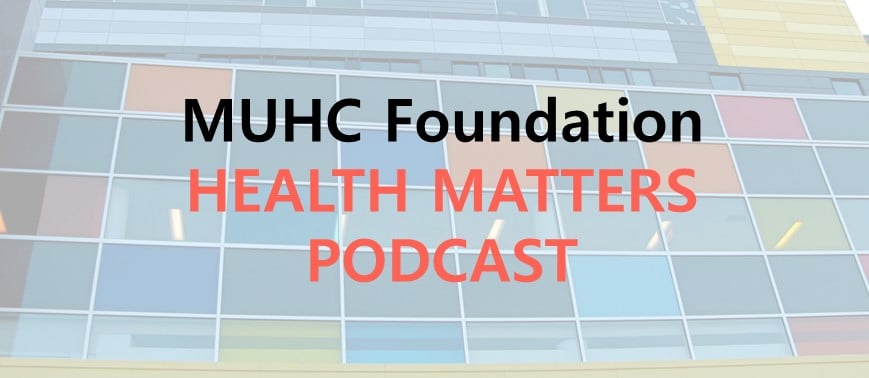
Health Matters: Sleep apnea and wearable technology
MUHC Foundation Health Matters interview with John Kimoff on a new clinic that is helping patients sleep and breathe easier using wearable technology

Run for a Reason 2022
Meet the MONTREAL CHEST HOSPITAL (MCI) team at the 2022 MUHC Foundation’s “Run for a Reason” charity challenge

Health Matters: Early Lung Cancer Screening & How are you Sleeping?
Dr. Nicole Ezer discusses early lung cancer screening and R. John Kimoff discusses what a good night’s sleep actually means

Sleep, Pregnancy, and Type 2 Diabetes
Dr. Pamidi’s study on sleep, pregnancy & type 2 diabetes highlighted for World Diabetes Day.
Lung Cancer
This research themes is developing tools and technologies to optimize the selection of patients for lung cancer screening. In collaboration with MUHC clinics, research is focused on access to timely care and diagnosis. Researchers developed the first lung-cancer screening program in Quebec. Effort are focused on developing applications and a web-based screening program for Quebec patients and families. These screening tools and eHealth technologies rely on big data and integrate computer-assisted chest CT scan interpretation, smoking cessation practices, and COPD screening. A translational research arm focuses on biobanking for biomarker discovery.

Recent Posts

Disparity in Lung Cancer Survival Rates
Publication by Faiz Ahmad Khan highlights disparities in lung cancer survival rates faced by residents of Nunavik.

2023 MUHC Foundation MCI Innovation Grant Awards
Congratulations to the 2023 MUHC Foundation MCI Innovation Grants competition winners, Jonathon Campbell, Maziar Divangahi, Nicole Ezer, Simon Rousseau, Sushmita Pamidi, Salman Qureshi and Bryan Ross!

Health Matters: Prehabilitation Program for Lung Cancer
MUHC Foundation Health Matters interview with Becklake Fellow Everglad Mugutso about her prehabilitation research for patients with lung cancer
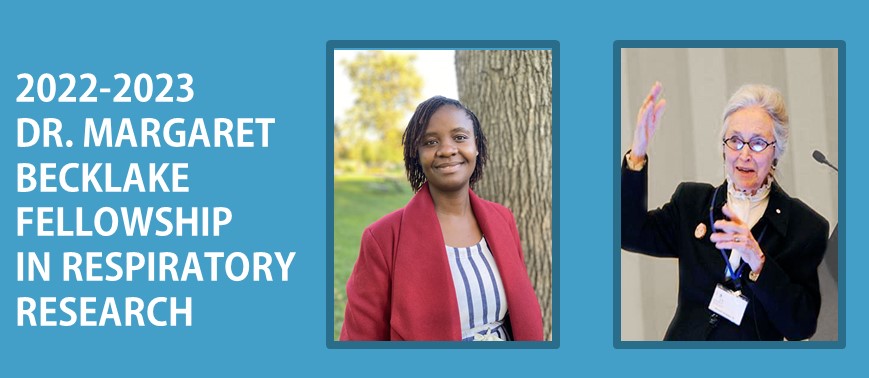
2022-2023 Dr. Margaret Becklake Fellowship
Everglad Mugutso is the recipient of the 2022-2023 Dr. Margaret Becklake Fellowship in Respiratory Research

Podcast: increased lung cancer in Rouyn-Noranda
Nicole Ezer, MD, speaks with Elias Makos of iHeart radio on the effects of arsenic emitted by the copper smelter in Rouyn-Noranda, QC.

Run for a Reason 2022
Meet the MONTREAL CHEST HOSPITAL (MCI) team at the 2022 MUHC Foundation’s “Run for a Reason” charity challenge
Featured Research Accomplishments & Publications
BCG Vaccine Offers Cross-protection Against Influenza
January 22, 2024
Publication in Nature Immunology by Maziar Divangahi and his research team describes how Bacille Calmette-Guérin (BCG) vaccination provides additional protection against unrelated pathogens, including influenza A viral infection. Nature Immunology 2024; 25(3):418-431.
All Airway Trees are Not Created Equal
July 26, 2023
A study by Benjamin Smith reveals that airway-to-lung size ratio is possibly the most important factor in death by lung disease. The results of this study showed that, overall, individuals with larger lungs had a higher resistance to COPD or other lung diseases. European Respiratory Journal. 2023; 61(6):2300551.
50 Years of Excellence in Respiratory Research
May 17, 2023
The Meakins-Christie Laboratories celebrate their 50th anniversary with a 2 day scientific symposium. A reception at the Maude Abbott Medical Museum opened the event. The guest list included Dr. Jonathan L. Meakins, grandson of Dr. Jonathan C. Meakins, the eminent respiratory researcher who, with his colleague Dr. Ronald Christie, lent his name to the Meakins-Christie Laboratories in 1972.
Vaping Can Cause Significant Harm to the Lungs
February 2, 2023
New research carried out in the lab of Carolyn Baglole, PhD, affirms that vaping can cause significant damage to the lungs. Even at this low level of exposure, the lung undergoes significant cellular and molecular changes. Vaping is therefore not a harmless tool to aid in smoking cessation. FASEB J. 2023 Feb;37(2):e22732.
Prenatal Programming of Alveolar Macrophages by Neutrophils Needed for Lung Health
January 5, 2023
Divangahi lab shows that the production of eicosanoids by neutrophils is required for reprogramming alveolar macrophages during early life in the developing lung. Furthermore, they demonstrate that in the absence of alveolar macrophage reprogramming by neutrophils, there is an increased susceptibility to LPS-induced acute lung injury, pulmonary influenza A virus and SARS-CoV-2 infections in preclinical models. Nature. 2023; 614(7948):530-538.
June 10, 2022
Study by Benjamin Smith suggests that dysanapsis of the lower airway and its association with airflow obstruction is specific to the lower airway and does not extend to the upper airway. Am J Respir Crit Care Med. 2022; 206(7):913-917.
Mtb Can Reprogram Stem Cells to Impair Innate Immunity Against TB
October 29, 2020

Publication in Cell by Maziar Divangahi shows that stem cells can be targeted for protective vaccination as well as be hijacked by a pathogen to increase TB virulence. Soon after Mtb infection, the bacteria translocate from the lungs to the bone marrow and reprograms stem cells to impair innate immunity against TB.
Chlorine Gas, Airway Inflammation and Cysteinyl Leukotrienes
August 28, 2020

Editorial: Chlorine Gas, Airway Inflammation, and Cysteinyl Leukotrienes: The Neutrophil Does Not Work Alone. Publication by James Martin shows that neutrophils, epithelial cells, and other lung cells all play a roll for Chlorine to induce airway hyperresponsiveness. Publication PMID: 32697598.
Dysanapsis Is a Strong Risk Factor for COPD
June 9, 2020

JAMA publication by Benjamin Smith highlights dysanapsis as a strong risk factor for chronic obstructive pulmonary disease (COPD). Dysanapsis is a developmental mismatch between airway and lung size. While the root cause for dysanapsis remains unknown, these findings help understand why COPD can occur in people who never smoked and do not have other risk factors.
β-glucan Induces Protective Trained Immunity
May 19, 2020
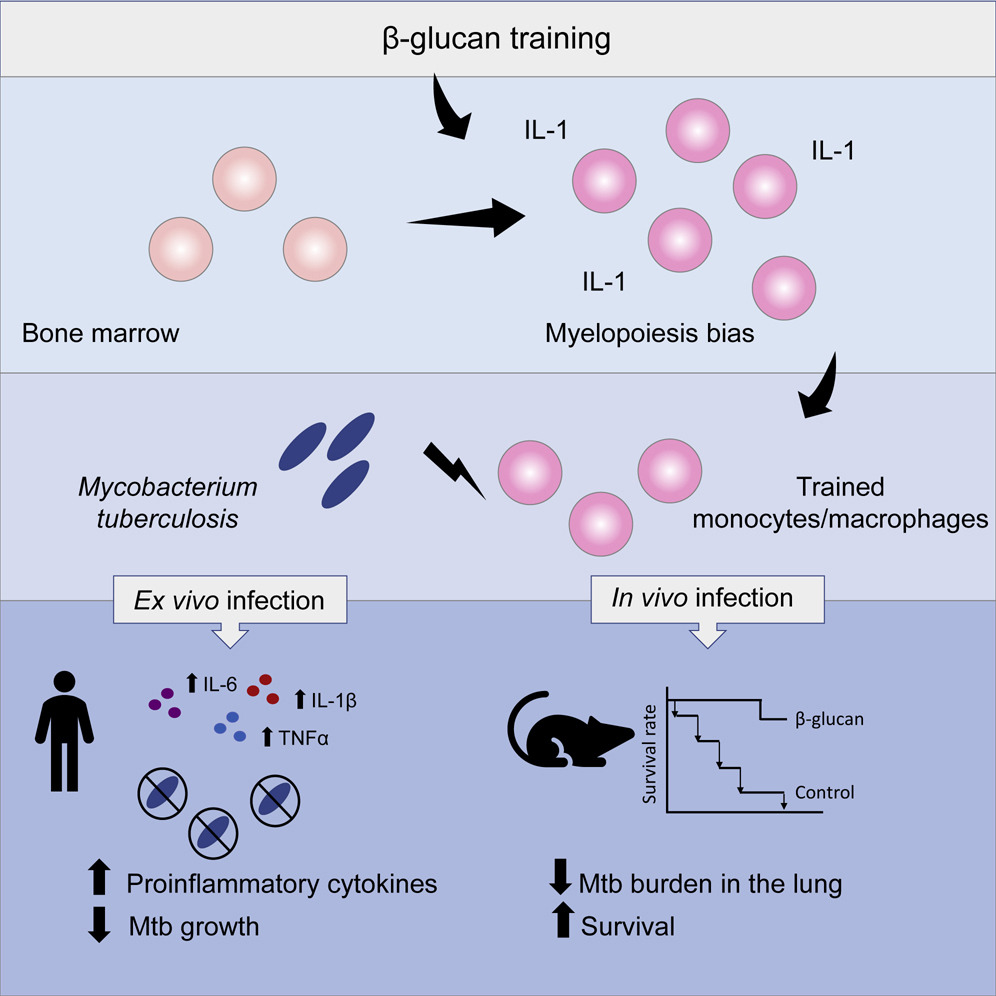
May 19, 2020. Cell Reports Publication by Maziar Divangahi shows that β-glucan induces protective trained immunity in human monocytes infected with Mycobacterium tuberculosis, as well as in mice infected with Mycobacterium tuberculosis. Their work is paving the way for both prophylactic and therapeutic use of β-glucan in TB.
New Role for the Lipid Mediator Leukotriene B4 in the Lung
August 4, 2019

Nature Microbiology publication by William Powell and Maziar Divangahi identified a new role for the lipid mediator Leukotriene B4 in the lung. They show that the LTB4 molecule is capable of not only reducing collateral tissue damage caused by immune responses in response to flu (influenza) infection, but also enhancing host survival.
Anti-TB Drugs Cause Changes to Gut Microbiota, Compromising Immunity
May 12, 2019

Mucosal Immunology publication by Irah King, Maziar Divangahi showed that anti-tuberculosis drugs caused changes to gut microbiota, thereby compromising immunity. This then led to an increased susceptibility to Mycobacterium tuberculosis infection. This work provides a basis for novel therapeutic strategies exploiting the gut-lung axis in Mtb infection.
New Cellular Target Can Weaken the Bacterium Pseudomonas aeruginosa
September 10, 2018

PNAS publication by Dao Nguyen identified a new cellular target that can weaken the bacterium Pseudomonas aeruginosa, a daunting microbe which can become highly tolerant to many antibiotics. They found that inhibition of the enzyme activity (superoxide dismutase) or the stress signaling system renders the pathogen more susceptible to antibiotics.
CypD is a Key Checkpoint for T Cell Metabolism and Regulates Disease Tolerance in TB
May 11, 2018

Science Immunology publication by Maziar Divangahi tries to explain why the vast majority of people infected with Mycobacterium tuberculosis (Mtb) can tolerate the infection without developing disease. The study determined that the mitochondrial protein cyclophilin D (CypD) acts as akey checkpointfor T cell metabolism and regulates disease tolerance in TB.
Variations in Lung Anatomy Associated with COPD
January 30, 2018
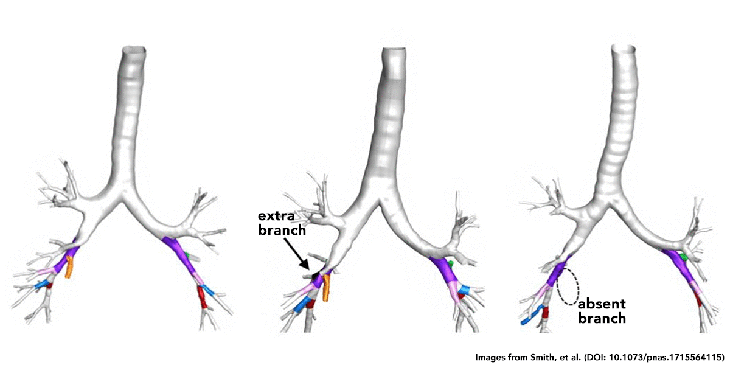
January 30, 2018. PNAS publication by Benjamin Smith and Carolyn Baglole shows that the internal anatomy of our lungs is surprisingly variable. Some of those variations are associated with a greater risk of chronic obstructive pulmonary disease (COPD).
BCG Educates Stem Cells for Protective Innate Immunity Against TB
January 11, 2018
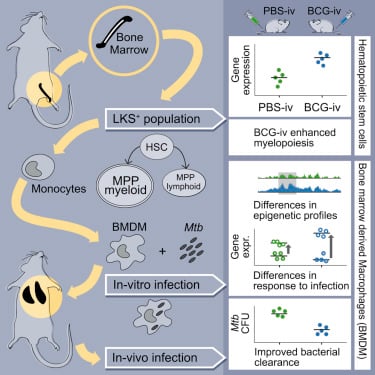
Cell Publication: BCG Educates hematopoietic stem cells to generate protective innate immunity against TB. Publication by Maziar Divangahi shows for the first time that when BCG is administered to mice in a way that enables access to the bone marrow, it can reprogram stem cells and offers long-term innate immune protection against M. tuberculosis infection.
Mechanical Ventilation Induces Diaphragmatic Dysfunction in Duchenne Muscular Dystrophy Mice
October 10, 2017

Editorial: Mechanical Ventilation for DMD: Sinner or Saint? Publication by Basil Petrof shows short‐term mechanical ventilation induces rapid diaphragmatic force loss and biochemical changes consistent with VIDD in mdx mice. This may have implications for the optimal use of intermittent mechanical ventilation in DMD patients. Original Publication PMID: 28786111.
RIPK3 Protein is Involved in the Regulation of Immune Response to the Flu
April 14, 2017

PLoS Pathogen publication by Maziar Divangahi, James Martin, Salman Qureshi. Their research is trying to understand how the mechanisms of the immune system fight the flu in the hopes of finding new immunotherapies to combat the virus. The discovery of the RIPK3 protein that is involved in the regulation of immune response to the flu means help may be on the horizon.
STAT6- Inhibitory Peptide May Reduce Incidence of RSV-Related Asthma
February 10, 2017

February 10, 2017. Journal of Leukocyte Biology publication by Elizabeth Fixman demonstrates that STAT6-IP reduces the development of allergic-type lung inflammation and airway hyperresponsiveness in mice re-challenged with respiratory syncytial virus. This peptide may reduce the incidence of RSV-related asthma.
Benefits of Newborn Screening for Cystic Fibrosis
May 15, 2016

Journal of Cystic Fibrosis publication by Larry Lands reinforces the benefits of newborn screening for Cystic Fibrosis patients. Children with Cystic Fibrosis who are diagnosed through newborn screening are healthier and benefit more from new treatments.
First Proof That Mechanical Ventilation Can Cause Human Diaphragm Dysfunction
April 14, 2016

Thorax Editorial: Respiratory muscle wasting in the ICU. Publication by Sabah Hussain provides the first proof that mechanical ventilation can cause contractile dysfunction of the diaphragm in humans. Original PMID: 27033022.
Toll-like Receptor Signalling in Regenerative Myogenesis: Friend and Foe
March 9, 2016

March 9, 2016. Journal of Pathology Commentary. Toll-like receptor signalling in regenerative myogenesis: friend and foe. Publication by Basil Petrof, Maziar Divangahi, Salman Qureshi suggests that macrophage function and skeletal muscle repair depends greatly upon the muscle injury context and the micro‐environment. Modifying the inflammatory milieu in dystrophic muscle may serve as a useful therapeutic measure in DMD. Original PMID: 26800321.
STAT6 Inhibitory Peptide Educated the Immune System From Developing an Allergic Response
February 29, 2016

Feb 29, 2016. Feature. 2015 Mucosal Immunology; 2011 Clinical & Experimental Allergy; 2007 Journal of Immunology. Publications by Elizabeth Fixman and Christine McCusker. Dr, Fixman developed STAT6-IP, a chimeric inhibitory peptide with the ability to enter cells and disrupt activity of the STAT6 transcription factor. STAT6 has been show to inhibit aberrant Th2 responses in the airways of preclinical models of asthma.
Variants of Pseudomonas aeruginosa Can Cause a Lot of Inflammation
July 31, 2015

July 31, 2015. Science Advances publication by Dao Nguyen shows that there are variants of Pseudomonas aeruginosa, a bacteria commonly found in Cystic Fibrosis patients, that can cause a lot of inflammation. Nguyen’s team is the first to make the connection between the bacteria and inflammation.
T Cells and Airway Smooth Muscle Interactions in Asthma
July 14, 2014

July 14, 2014. Perspectives Editorial in the J of Physiology. In the field, it was still unknown whether airway smooth muscle activation by activated T cell binding could also affect airway smooth muscle contractility. Work by the Lauzon group provides evidence for this targeted T cell–airway smooth muscle cell interaction resulting in increased airway smooth muscle shortening velocity. The work shows that inflammatory cells promote airway smooth muscle hypercontractility in airway hyper-responsiveness and asthma. Original publication PMID: 24687581.
STAT-6 Inhibitory Peptide Inhibits Aberrant Th2 Responses in RSV Infection
June 5, 2014

European Journal of Immunology publication by Elizabeth Fixman. The STAT6 inhibitory peptide can educate the immune system away from developing an allergic response. STAT6 has been show to inhibit aberrant Th2 responses in the airways of preclinical models of respiratory syncytial virus infection.
Inhibition of PGE2 Increases Survival of Mice Infected With H1N1 Flu Virus
April 17, 2014

Immunity publication by William Powell, Maziar Divangahi revealed that a drug that inhibits PGE2 increases survival of mice infected with H1N1 flu virus. This finding paves the way for urgently needed novel therapies that may be effective against the flu and other viral infections.
Pseudomonas aeruginosa and Biofilms: New Insights on Antibiotic Tolerance
November 18, 2011

This Week in Science Feature: Arrest and Tolerate. Publication by Dao Nguyen on Pseudomonas aeruginosa and biofilms: new insights on antibiotic tolerance. Publication shows that antibiotic tolerance occurs, not because the targets of antibiotics have become inactive during growth arrest, but because starvation-sensing mechanisms generate protective responses. Original Publication PMID: 22096200.
Meakins-Christie Laboratories Founded
August 1, 1972
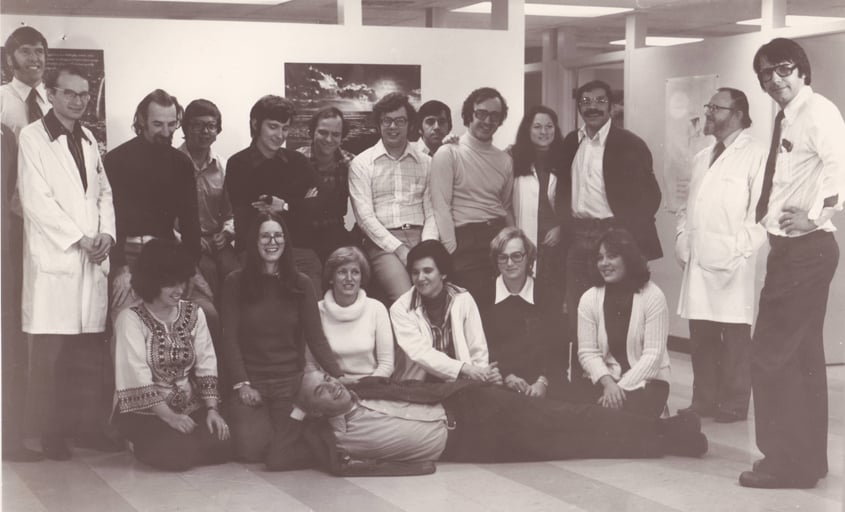
The Meakins-Christie Laboratories for Respiratory Research was officially opened in August 1972. From the beginning, the laboratories were designed to be interdisciplinary, and physiologists, physicians, epidemiologists, pathologists, radiologists, and biomedical engineers were invited to participate.
…………………………………………………………………………………………………………………………………………………………………………………………………………………………………………………………………………………………………………………………………………………………………………………………………………………………………………………………………………………………………………………………………………………………



